Top Rankings
St. Cloud Public School District ranks among the top 20% of public school district in Minnesota for:
Category
Attribute
Diversity
Most diverse schools (Top 1%)
Community Size
Largest student body (number of students) (Top 1%)
For the 2025 school year, there are 8 public preschools serving 3,669 students in St. Cloud Public School District. This district's average pre testing ranking is 3/10, which is in the bottom 50% of public pre schools in Minnesota.
Public Preschools in St. Cloud Public School District have an average math proficiency score of 36% (versus the Minnesota public pre school average of 45%), and reading proficiency score of 42% (versus the 47% statewide average).
Minority enrollment is 65% of the student body (majority Black), which is more than the Minnesota public preschool average of 42% (majority Hispanic and Black).
Overview
This School District
This State (MN)
# Schools
26 Schools
722 Schools
# Students
9,543 Students
214,815 Students
# Teachers
709 Teachers
16,916 Teachers
Student : Teacher Ratio
13:1
13:1
District Rank
St. Cloud Public School District, which is ranked within the bottom 50% of all 522 school districts in Minnesota (based off of combined math and reading proficiency testing data) for the 2021-2022 school year.
The school district's graduation rate of 61% has decreased from 76% over five school years.
Overall District Rank
#388 out of 527 school districts
(Bottom 50%)
(Bottom 50%)
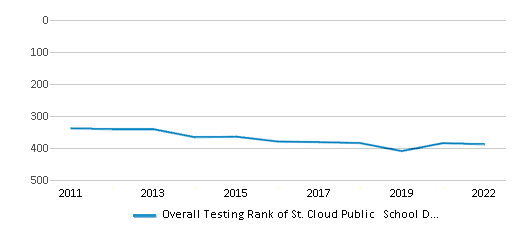
Math Test Scores (% Proficient)
28%
45%
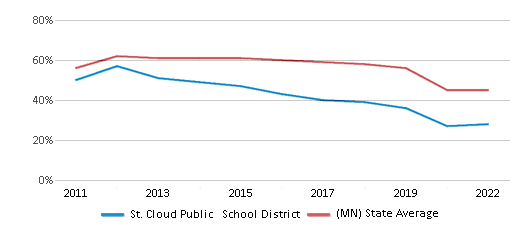
Reading/Language Arts Test Scores (% Proficient)
38%
51%
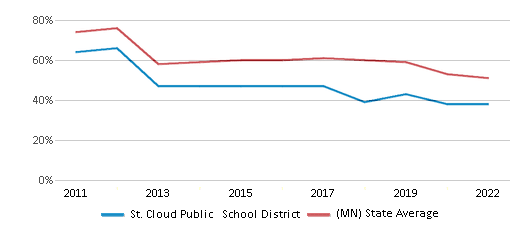
Science Test Scores (% Proficient)
27%
41%
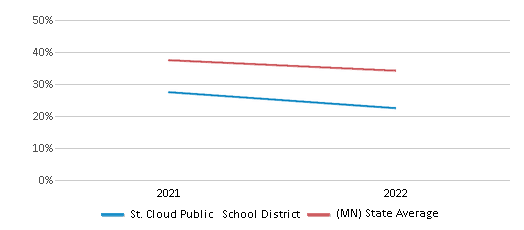
Graduation Rate
61%
84%
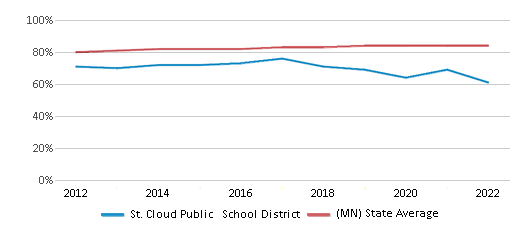
Students by Ethnicity:
Diversity Score
0.69
0.63
# American Indian Students
54 Students
4,606 Students
% American Indian Students
1%
2%
# Asian Students
257 Students
15,449 Students
% Asian Students
3%
7%
# Hispanic Students
1,037 Students
28,913 Students
% Hispanic Students
11%
13%
# Black Students
3,844 Students
27,236 Students
% Black Students
40%
13%
# White Students
3,553 Students
123,893 Students
% White Students
37%
58%
# Hawaiian Students
21 Students
300 Students
% Hawaiian Students
n/a
n/a
# Two or more races Students
777 Students
14,418 Students
% of Two or more races Students
8%
7%
Students by Grade:
# Students in PK Grade:
493
24,443
# Students in K Grade:
713
34,761
# Students in 1st Grade:
746
32,541
# Students in 2nd Grade:
707
32,166
# Students in 3rd Grade:
638
29,034
# Students in 4th Grade:
624
28,343
# Students in 5th Grade:
641
24,163
# Students in 6th Grade:
562
7,122
# Students in 7th Grade:
612
1,002
# Students in 8th Grade:
630
940
# Students in 9th Grade:
712
44
# Students in 10th Grade:
726
46
# Students in 11th Grade:
830
48
# Students in 12th Grade:
909
162
# Ungraded Students:
-
-
District Revenue and Spending
The revenue/student of $18,160 is higher than the state median of $17,854. The school district revenue/student has stayed relatively flat over four school years.
The school district's spending/student of $17,668 is less than the state median of $18,580. The school district spending/student has stayed relatively flat over four school years.
Total Revenue
$173 MM
$15,547 MM
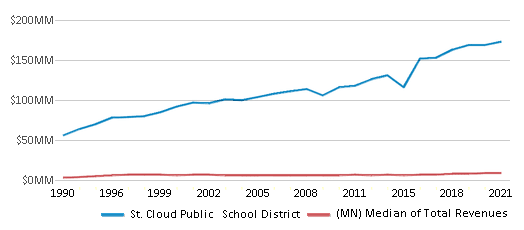
Spending
$169 MM
$16,179 MM
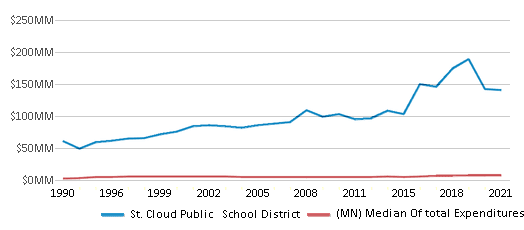
Revenue / Student
$18,160
$17,854
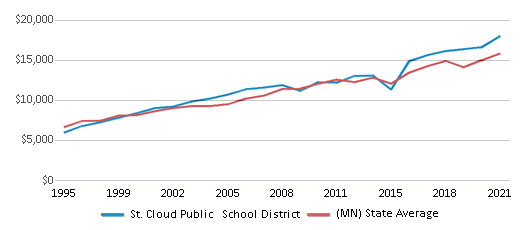
Spending / Student
$17,668
$18,580
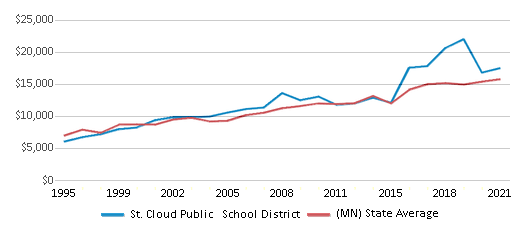
Best St. Cloud Public School District Public Preschools (2025)
School
(Math and Reading Proficiency)
(Math and Reading Proficiency)
Location
Grades
Students
Rank: #11.
Kennedy Community School
(Math: 43% | Reading: 53%)
Rank:
Rank:
6/
Top 50%10
1300 Jade Rd
Saint Joseph, MN 56374
(320) 370-7430
Saint Joseph, MN 56374
(320) 370-7430
Grades: PK-8
| 608 students
Rank: #22.
Oak Hill Community Elementary School
(Math: 40% | Reading: 46%)
Rank:
Rank:
4/
Bottom 50%10
2600 County Road 136
Saint Cloud, MN 56301
(320) 370-6000
Saint Cloud, MN 56301
(320) 370-6000
Grades: PK-5
| 752 students
Rank: #33.
Madison Elementary School
(Math: 29% | Reading: 31%)
Rank:
Rank:
2/
Bottom 50%10
2805 9th St N
Saint Cloud, MN 56303
(320) 370-6330
Saint Cloud, MN 56303
(320) 370-6330
Grades: PK-5
| 671 students
Rank: #44.
Special Education Facilities
Special Education School
(Math: <50% | Reading: ≤20% )
Rank:
Rank:
2/
Bottom 50%10
1201 2nd St S
Waite Park, MN 56387
(320) 370-8000
Waite Park, MN 56387
(320) 370-8000
Grades: PK-12
| 59 students
Rank: #55.
Discovery Community Elementary School
(Math: 25% | Reading: 27%)
Rank:
Rank:
2/
Bottom 50%10
700 7th St S
Waite Park, MN 56387
(320) 370-6180
Waite Park, MN 56387
(320) 370-6180
Grades: PK-5
| 540 students
Rank: #66.
Talahi Community Elementary School
(Math: 25% | Reading: 26% )
Rank:
Rank:
1/
Bottom 50%10
1321 University Dr Se
Saint Cloud, MN 56304
(320) 370-7780
Saint Cloud, MN 56304
(320) 370-7780
Grades: PK-3
| 710 students
Rank: n/an/a
Ec Sp Educational At Quarryview Educational Center
Special Education School
800 7th St. S.
Waite Park, MN 56387
(320) 370-8261
Waite Park, MN 56387
(320) 370-8261
Grades: PK
| 304 students
Rank: n/an/a
St. Cloud Hospital Programs Non-res
Alternative School
1406 6th Ave N
Saint Cloud, MN 56303
(320) 370-6895
Saint Cloud, MN 56303
(320) 370-6895
Grades: PK-12
| 25 students
Recent Articles

What Is A Charter School?
Explore the world of charter schools in this comprehensive guide. Learn about their history, how they operate, and the pros and cons of this educational innovation. Discover key facts about charter schools, including admission policies, demographics, and funding, as well as what to look for when considering a charter school for your child.

10 Reasons Why High School Sports Benefit Students
Discover the 10 compelling reasons why high school sports are beneficial for students. This comprehensive article explores how athletics enhance academic performance, foster personal growth, and develop crucial life skills. From improved fitness and time management to leadership development and community representation, learn why participating in high school sports can be a game-changer for students' overall success and well-being.

February 05, 2025
Understanding the U.S. Department of Education: Structure, Impact, and EvolutionWe explore how the Department of Education shapes American education, from its cabinet-level leadership to its impact on millions of students, written for general audiences seeking clarity on this vital institution.





